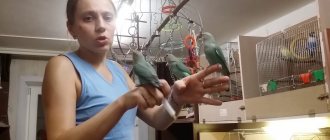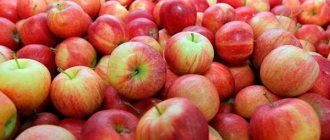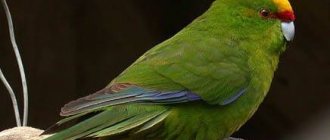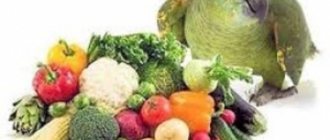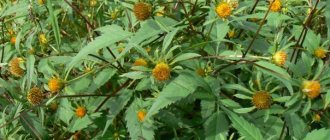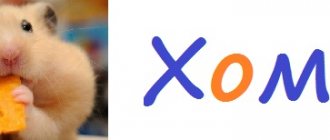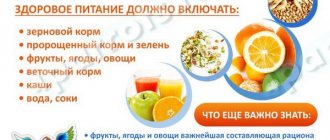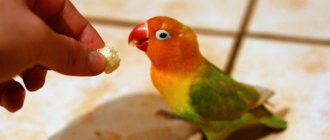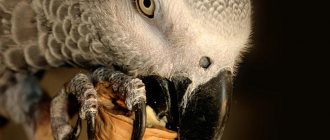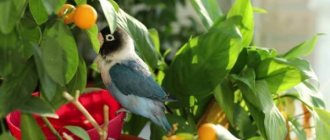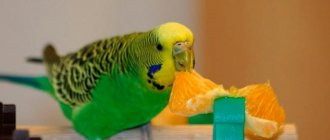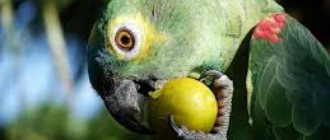Almost everyone knows that parrots are birds that live in the wild in tropical and subtropical climates. Such regions are overflowing with an abundance of various greens, which is why the usual diet of birds consists of fruits, roots and stems of plants. And if it is difficult to find the roots of tropical trees, as well as their succulent branches on the market, everyone can provide the diet of a domestic parrot with a sufficient amount of fruit. Just to know which fruits bring the maximum benefit to birds, and which ones should be reduced or stopped completely.
List of suitable fruits
Almost all fruits sold in markets can be included in the diet of pet parrots as an essential source of microelements, vitamins and fiber. All this affects the general condition of the birds, their appearance and activity.
Among the huge list of fruits, the following can be considered suitable for parrot food.
- Citrus fruits: grapefruit, tangerine, orange. They contain vitamin C, essential for the development of pets, acids of organic origin, and carbohydrates. The fruit should be peeled, divided into slices or cut into pieces, and placed in a feeder.
- Pears and apples are the most common fruits available all year round. In addition to the same vitamin C, they contain iron, potassium and a large amount of fiber. The fruits do not need to be peeled, but only washed and cored.
- Bananas. They are perceived by birds as familiar food, which they still eat with pleasure. Before serving, the fruits must be peeled and divided into slices.
- Grape. An excellent option due to the large amount of iron in the composition. The specific variety does not matter, it is only important to choose ripe, not too sour fruits. Grapes are good at cleansing parrots’ bodies of toxins and filling the body with antioxidants that help fight diseases.
- Kiwi. A seasonal fruit that perfectly solves the problem of replenishing the winter vitamin C deficiency. Before serving, it must be peeled and divided into small pieces.
- Watermelon. A good option during the fruiting season. Actively quenches thirst, due to the large amount of fiber it normalizes the functioning of the gastrointestinal tract and fills the body with vitamins. You can give it to parrots every day along with grains.
- Apricots, peaches. Be sure to remove the seeds before serving, as they contain hydrocyanic acid, which is poisonous to all living organisms. Not the healthiest fruits, but they are great as an option for diversifying your diet.
- A pineapple. Can be used as parrot food, but in limited quantities. Before serving, the pineapple is peeled and hard core, divided into small slices.
Attention! All fruits listed must not be spoiled or unripe. Otherwise, instead of benefit, the birds will receive colossal harm from such nutrition.
In addition to fresh fruits, you can diversify the diet of parrots, especially in winter, with dates, raisins, dried apricots, prunes and even quince. Berries can also be used: sea buckthorn, lingonberries, currants. A small nuance - before using dried fruits, they must be soaked in boiling water to steam them.
Does a lovebird need a mate?
Exotic lovebirds got their name from a beautiful legend.
According to it, birds choose a couple of times in their lives, touchingly care for each other and languish with melancholy if they lose a partner. However, this is just a legend; in fact, the mate is not important to the lovebird. If you are in doubt about whether to get only one parrot, feel free to decide. In the same way, you can add a new pair to a lovebird who is left alone. The decision to have one parrot should be made consciously. A pair of lovebirds will never be bored; the birds keep themselves busy. If the lovebird lives alone, you will need to devote more time to him and entertain him. If the bird will often have to be left alone and will rarely communicate with it, then it is better to get a pair of lovebirds.
Fruit diet for different types of parrots
The general characteristics for preparing suitable food for birds are understood. It remains to be seen whether this parameter differs depending on the species differences of birds.
Jaco, cockatiel
In addition to the previously indicated fruits, these parrots can be fed:
Rosella
- various berries;
- pomelo;
- lime;
- pomegranate
They like to eat:
- feijoa;
- persimmon;
- pomegranate;
- lingonberries.
Lovebirds
The main thing you should know about the fruit diet of this type of parrot is that they can easily consume pears and apples along with the seeds, and also eat some of their citrus fruits along with the peel.
Fact! If a parrot has never tried a particular fruit before and spits out a piece during the first tasting, this does not mean that it did not like the fruit. The bird needs time to get used to new sensations.
What to look for when choosing fruits and berries
When choosing fruits, you need to pay attention to their freshness. Exotic fruits that do not grow in a certain region or in the Russian Federation in general are very often picked unripe, sprayed with chemicals and then taken to store shelves. Because of this, the fruits need to be washed thoroughly, and it is better to remove the peel. Also, if possible, you should take fruits grown in your own garden or garden.
Teaching parrots to eat fruit
Typically, breeders involved in breeding and selling exotic birds do not care much about the variety of their diet. The usual food for parrots in such conditions is cereal food, water, and maybe some inexpensive vegetables. To teach your feathered pet to eat fruit, you will have to be patient and follow a few simple rules.
- Cut the fruits in several ways: into slices, pieces, grate or puree. The same option is perceived differently by the bird depending on the form of its presentation.
- Taste the fruit before the bird. Birds not accustomed to captivity are wary of anything new, which is why unfamiliar food is often perceived as a threat. If you try a new delicacy in front of them, the parrots, imitating their owners, will definitely repeat this action themselves.
- Bright additions. Curious pets are more willing to try assorted fruits on bright holders or colorful skewers than just laid out in a feeder.
- Favorite zone. An excellent solution is to place treats in the place where the parrot spends most of his time. This will make him more likely to be interested in the new food.
- Starvation. A radical solution that is resorted to in rare cases. To do this, you need to remove grain food from the bird’s cage, replacing it with fruit alone for the whole day. The moment the parrot gets hungry, he will be forced to try a new treat.
Important! Birds should not be introduced to fruits during their molting period. This can worsen the condition of the plumage.
How much should I add to the diet of wavy birds?
The serving size depends on the breed, well-being and taste preferences of the parrot. For small birds, a quarter of the cut (approximately 75 g) is enough. Whereas large birds can be given a whole slice (about 300 g).
The berries need to be warmed to room temperature. Watermelon cannot be served cold, otherwise your pet will get a goiter cold .
It’s good if the cage has a special fruit holder. It’s easy to make such a design yourself, or buy it at a pet store, fortunately it costs a penny.
Watermelon pulp is a favorable environment for the proliferation of harmful bacteria. You cannot leave a berry in a cage for more than an hour, otherwise it will become a breeding ground for microorganisms. The same applies to liquid leaking from the pulp onto the pan.
Why do parrots refuse fruit?
Despite all the efforts of the owners, there are cases when birds refuse to eat fruit. This happens for a number of reasons.
- Personal preferences of birds. Despite the bright taste and juiciness of a particular fruit, the parrot may simply not like it. If the bird continues to stubbornly refuse a particular fruit, you can try replacing it with another.
- Keeping pets. Due to prolonged feeding of grain alone, birds are simply afraid to try something new. Therefore, it is better to accustom parrots to fruits as early as possible.
Attention! Such food quickly fills the small stomach of the birds, satisfying their hunger, but the feeling of fullness quickly passes. Conclusion - fruit food should be consumed in the afternoon.
If poisoning - what to do
Sure signs of poisoning are apathy: the parrot huddles in the corner of the cage and practically does not react to its surroundings. This may also include loss of appetite, loss of coordination, trembling, vomiting and convulsions. At the first signs of poisoning, the surest option is to contact a veterinary clinic. In difficult cases, it is more advisable to call a specialist to your home rather than add stress to the bird with a trip.
The use of medications is not recommended. Only a veterinarian can make a correct diagnosis. It may turn out that the parrot does not have poisoning at all, but a viral infection. Unprofessional actions by the owner will only make the situation worse.
During the period of treatment and prevention, the cage must be thoroughly cleaned and disinfected. This applies not only to the frame, but also to the accompanying equipment: toys, feeders, bathing bowls, drinking bowls and other accessories. If there are two or more birds, then healthy birds urgently need to be transplanted into another cage to prevent infection.
Which fruits are best to avoid?
Despite the omnivorous nature of parrots, it is better for them not to eat some fruits. We are talking about papaya, mango, persimmon and avocado. Due to the high content of essential oils and tannins, they can cause harm to birds, especially the cockatiel parrot.
Another forbidden delicacy is dates and bananas, because they contain a lot of sugar. You can give them to parrots, but rarely and in small quantities. There is no need to overdo it with green apples - excess acid will cause problems with the gastrointestinal tract and can cause molting. Filling your pet parrots' diet with a variety of fruits, especially exotic ones, is an important step. With the help of such food, birds receive all the necessary vitamins required for the health and excellent appearance of their pets.
Vegetable menu
Your budgerigar should be fed fresh vegetables daily.
Vegetables that should be present in a bird’s diet:
- Beijing, cauliflower, white cabbage and broccoli contain a lot of useful substances, improve metabolic processes, and quickly cleanse the body of toxins.
- Pumpkin will help your bird stay alert and energetic, regulate water-alkaline balance, strengthen the vascular system, and improve intestinal motility.
- Carrots, rich in carotene, pantothenic and ascorbic acid, can be given to your budgie daily. It is especially useful during the growth period of the bird. Regulates hemoglobin levels, improves vision.
- Cucumber dissolves sand and kidney stones, improves blood properties and perfectly cleanses the intestines of birds.
- In terms of its biochemical composition, beets are a leader among other vegetables. Thanks to antioxidants and a large number of other beneficial microelements, beets are an essential element of the diet for a budgie.
- Bell peppers of both red and green varieties will replenish the bird’s body with useful substances in an easily digestible form and a powerful source of vitamin C. You should make sure that this is a variety of sweet and not bitter pepper before offering it to the bird.
- Tomatoes are a source of good health and longevity. They normalize metabolism and prevent the occurrence of infectious diseases.
You can offer your bird sun-dried tomatoes, preparing them in small batches. Pumpkin is offered baked, fresh and as part of crumbly porridges.
Mineral supplements
During the period of active growth, when changing plumage, during nesting, lovebirds need increased nutrition. Regular food does not contain enough minerals; in addition, not all micro- and macroelements are properly absorbed. To compensate for the lack of nutrients, parrots need mineral supplements:
- sepia (cuttlefish shell);
- chalk;
- bone flour;
- organic sand;
- clay;
- nut and eggshells;
- slaked lime.
Pet stores sell a specially selected Rio mineral mixture for parrots, which includes components for the proper functioning of the digestive system. A hard mineral stone is fixed to the wall of the cage to make it easier for lovebirds to break off pieces.
Benefit
An egg yolk is 70% organic and 28% protein. It contains vitamins A, D, E and K, as well as fats and other elements important for poultry, such as phosphorus, sodium, potassium and iodine. If you cook an egg correctly, it will still contain minerals: aluminum, bromine and boron.
The yolk is almost 90% liquid, while the rest is B vitamins. They are especially useful for young animals, so eggs must be included in the diet of chicks and weakened individuals.
Regular consumption of boiled eggs helps strengthen the immune system of birds and rapid growth of plumage, which is very important during the molting period
Who is suitable as a neighbor?
If the owner of a budgerigar wants to diversify the pet’s life by adding another bird to it, then in no case should you choose parrots such as gray parrots, necklaces or lovebirds. These feathered pets are too large for the “wavy” and can harm them. If a fight breaks out, the larger birds will win, possibly seriously injuring the losing parrot. And an injury such as a broken leg is very serious.
It is best to choose canaries or finches as friends for budgies. But the most popular neighbors of wavy pets are cockatiels. Although they are birds of medium build, cockatiels are quite capable of calmly communicating with “wavy birds” in the same room and on the same playground.
Before buying another feathered pet, you need to understand whether a budgie needs a pair from a bird of a different species. Let's see if cockatiels and budgies can get along in the same cage.
